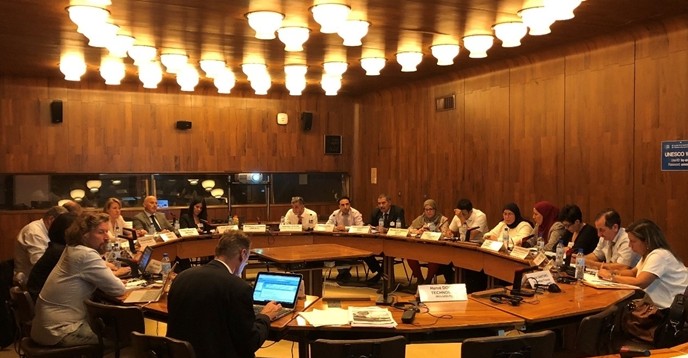Home: News | About YEM | Why YEM
Countries: Algeria | Israel | Jordan | Lebanon | Libya | Morocco | Palestine | Tunisia
Thematic Priorities: Skills anticipation | Work-based Learning | Digital skills mainstreaming | Entrepreneurship skills
Knowledge Resources: YEM Skills Panorama | Country Profiles | Data and Statistics | YEM Publications | Other useful resources
Networking: Discussion Forum | Blogs and Thinkpieces | Youth Homepage | Members of the Community | Join the Community
Events: Overview | Final YEM Regional Forum (July 15) | YEM Regional Forum (April 8)

On 21 to 22 June 2018, UNESCO and the European Training Foundation (ETF) organized a regional workshop about work-based learning (WBL) programmes for young people in the Arab region, at the UNESCO Regional Office in Beirut, Lebanon.
The workshop was part of two EU-funded projects that are implemented by UNESCO, namely the Networks of Mediterranean Youth (NET-MED Youth)![]() project that is in its closing phase, and the Youth Employment in the Mediterranean (YEM), a three-year project launched in 2018, that builds on the achievements of the Employment Component of the NET-MED Youth project.
project that is in its closing phase, and the Youth Employment in the Mediterranean (YEM), a three-year project launched in 2018, that builds on the achievements of the Employment Component of the NET-MED Youth project.
The workshop examined and discussed the status of work-based learning programmes for young people in the Arab region, and UNESCO shared and discussed the preliminary findings of a new comparative synthesis study that draws upon country studies from Algeria, Egypt, Jordan, Palestine, Lebanon, Morocco, Oman, and Tunisia.
Participants included country representatives that are leading work-based learning programmes; private sector representatives; youth advocates and members of other UN agencies and international organizations.
Ms. Hoda Bitar, a youth representative from Lebanon said about the workshop, that it motivated her to ensure that youth voices are reflected, included, and prioritized when designing and implementing work-based learning programmes.
Additional feedback came from Ms. Karima Bergheul, president of the Association of Women Working in a Green Economy (AFEV) in Algeria, who said: “The value-addition of the workshop was the sharing of country experiences from different stakeholders that helped participants resolve tensions and promote successful policies associated with quality WBL arrangements for young people.”
Khaled Abdel Azim, president of the Federation of Egyptian Industries said about the workshop that it was an important opportunity to get a comprehensive understanding of regional trends due to the different experiences and expertise of participants.
The youth unemployment rate in the south Mediterranean region is one of the highest in the world: in 2017, there were 2.6 million young people without a job. During the workshop, it was emphasized that WBL could benefit the employment rates by being a driver for expanding and improving the relevance of TVET for young people.
This included gaining more knowledge about WBL programmes, sharing country experiences, and networking with different stakeholders, and give concrete guidance towards developing regional guidelines for the Member States to implement quality WBL within the framework of YEM project.
The YEM project is being implemented over the time span of three years in Algeria, Egypt, Israel, Jordan, Lebanon, Libya, Morocco, Palestine and Tunisia, and aims to support youth employment and entrepreneurship in the Mediterranean Region through improving skills anticipation and technical and vocational education and training (TVET) systems.